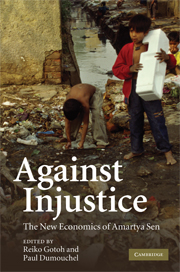Book contents
- Frontmatter
- Contents
- List of figures
- List of tables
- List of contributors
- Acknowledgements
- Introduction
- Part I
- Part II
- 4 The power of a democratic public
- 5 The challenge of gender justice
- 6 Gift, market, and social justice
- 7 Justice and public reciprocity
- 8 Reasoning with preferences?
- 9 Conceptions of individual rights and freedom in welfare economics: a re-examination
- Part III
- 13 Part IV
- Index
- References
7 - Justice and public reciprocity
Published online by Cambridge University Press: 18 January 2010
- Frontmatter
- Contents
- List of figures
- List of tables
- List of contributors
- Acknowledgements
- Introduction
- Part I
- Part II
- 4 The power of a democratic public
- 5 The challenge of gender justice
- 6 Gift, market, and social justice
- 7 Justice and public reciprocity
- 8 Reasoning with preferences?
- 9 Conceptions of individual rights and freedom in welfare economics: a re-examination
- Part III
- 13 Part IV
- Index
- References
Summary
Introduction
Is there any society where
Each individual produces different kinds of values that can be evaluated not only by the market but also by diverse social discourses or public reasoning?
And where
Every individual has access to enough resources (income, goods, services) to maintain his well-being, without losing the social basis of independence, responsibility and self-respect?
Such a society would be a “well-being society” that exemplifies the idea of going beyond the logic and ethics of the market. Its first feature is that it has plural evaluation systems other than the market price mechanism. The market's price mechanism evaluates goods and services based on universal supply and demand. It cannot allow price changes based on special privileges, and it contains no point of view from which we can ethically reflect upon its process and results. On the other hand, in a “well-being society” there are plural evaluation systems based on local relationships and public reasoning. These systems are diverse, taking place in communities, through Non Public Organization (NPO) activities or volunteer groups, and they are connected to each other in a consistent way, to the extent that resource transfers among them can be carried out publicly. The second feature is that each individual is committed “to work and to provide if possible” not by a legal obligation or by incentive devices, but by a publicly realized reciprocal relationship based on a shared rule.
- Type
- Chapter
- Information
- Against InjusticeThe New Economics of Amartya Sen, pp. 140 - 160Publisher: Cambridge University PressPrint publication year: 2009
References
- 2
- Cited by



